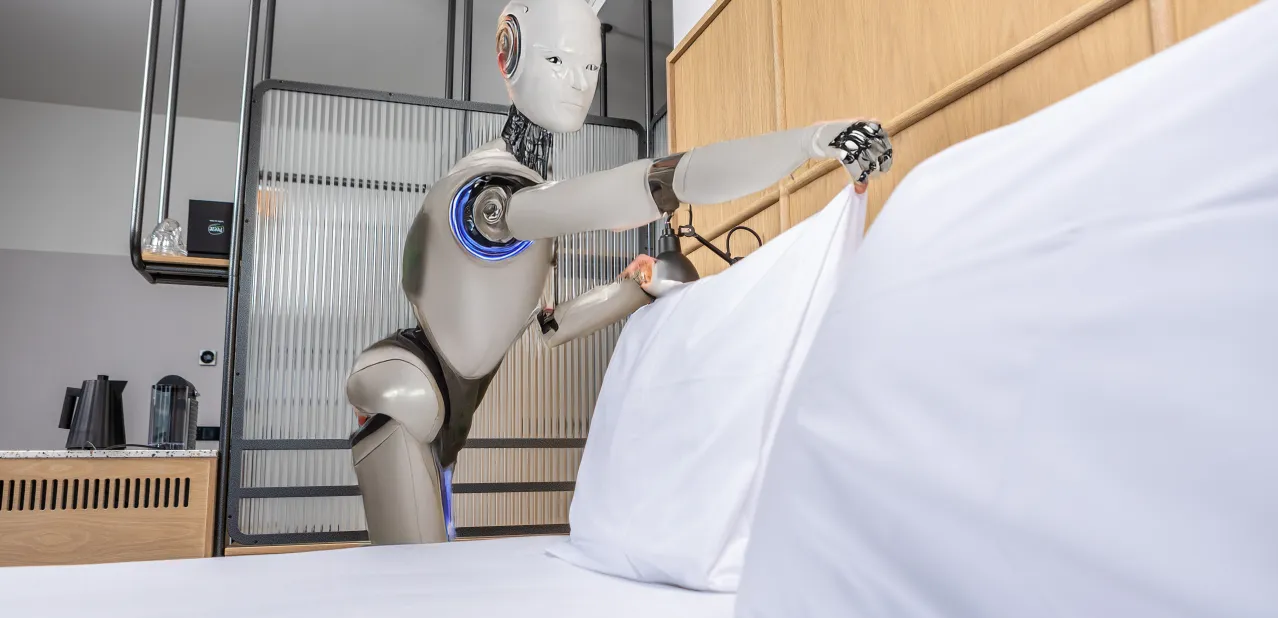A table for none? 4 scenarios on the labour shortage in tourism and hospitality

How do you envision the future of tourism and hospitality? Do you see robots in toques crafting dishes worthy of a Michelin star? Will our thirst for real-life adventurous experiences be replaced by simulations? The world is changing and so is the way we travel, interact, and entertain ourselves. But how do we cope with these changes when we’re also facing an ageing population and increasing competition between sectors? In his inaugural lecture as professor of applied sciences of Disruption, Innovation and New Phenomena, Professor Ian Yeoman gives insights into 4 scenarios that explore these challenges from a futurist perspective.
Scenario planning
To move forward and evoke real and effective structural change, you always need a plan. This is where scenario planning, Ian’s specialism, comes into play. “Scenario planning is a scientific method used to explore what could possibly happen in the future, not just based on what you already know but also from the perspective of what the uncertainties could be. Developing scenarios helps the industry to reflect and initiate change,” Ian explains. In Ian’s Future of Work project, he focused on how the labour shortage is threatening tourism and hospitality. “We looked at key realities and what we now need to do to ensure the sustainability of the industry.”
The scenarios
Technology appears to be stepping in to fill labour gaps in the tourism and hospitality industry. “There are two things shaping the future of work: demographic changes and fewer people are going to university. This is tightening the labour market,” Ian says. “How, when, and why we work have drastically changed in recent years. So, to respond to work pattern trends and labour shortages, we explored four scenarios:
Scenario #1: Robots run the kitchen
Inspired by Moley Robotics, who showcase technology’s potential to revolutionise the hospitality industry, we came up with a scenario in which robots run the kitchen. Imagine a robot chef winning a Michelin star for its culinary excellence. It makes you wonder whether this could in fact become a reality within the next 20 years. While there’s a lot of scepticism when it comes to robotics, this is certainly a possibility, especially as technology and food development are advancing with such speed.
Scenario #2: Virtual concerts and holographic popstars
Picture a world where technology brings fantasy to life, like in the TV series West World, where avatars create immersive experiences. As entertainment evolves, we see holographic pop stars and virtual concerts redefining festivals. With governments and businesses heavily investing in tech, we’ve started asking ourselves, ‘how far can we push technology to enhance our experiences?’
Scenario #3: Weekends Only
Have you noticed more and more restaurants are now closed for three or four days a week instead of two? Staff shortages are forcing businesses to cut operating days, creating an urgent need for innovative solutions. Think robotic room attendants and automated cleaning and cooking systems. This shift isn’t about fully replacing human workers but about redesigning operations to sustain the industry. And even then, we may only be able to enjoy a meal at our favourite restaurant on weekends only.
Scenario #4: The Day We Ran Out of Chefs
The end of hospitality. The end of tourism. That’s what we researched in this final scenario. At what point do you decide to close because staying open is just unsustainable? It’s becoming harder to attract qualified staff as the working conditions are less appealing than other industries.
The key to staying one step ahead
Taking the futurist perspective brought by Ian’s professorship allows the tourism and hospitality industry to identify trends and learn how to be proactive in responding to emerging challenges. “Working and studying with our professorship is about becoming able to stand on your head and to see the tourism and hospitality industry through a different lens, from different angles, to understand not only where’s it’s going and what’s coming next but also what it means to you. We have set out to become the global leader in transformational change, making sense of the future and taking you with us along the way.”

Ian Yeoman
Ian Yeoman is Professor of Applied Sciences at NHL Stenden’s Professorship on Disruption, Innovation, and New Phenomena. As the world’s first scenario planner in tourism at VisitScotland, Ian makes sense of the inevitable impacts of technological advances, climate change, and other external factors on the tourism and hospitality industry. Ian shares his knowledge and influence in the industry through Design-Based Education, workshops, publications, such as the Future Past of Tourism or Disruption, Science Fiction and Tourism, and scenarios. Interested in hearing more? Contact Ian at ian.yeoman@nhlstenden.com and stay informed.



